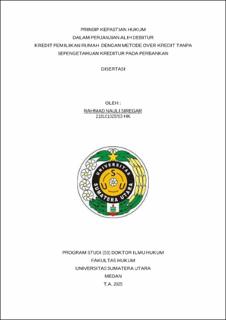Prinsip Kepastian Hukum Dalam Perjanjian Alih Debitur Kredit Pemilikan Rumah Dengan Metode Over Kredit Tanpa Sepengetahuan Kreditur Pada Perbankan
The Principle of Legal Certainty in Home Ownership Credit Transfer Agreements Using the Over Credit Method Without the Creditor's Knowledge in Banking

Date
2025Author
Siregar, Rahmad Nauli
Advisor(s)
Purba, Hasim
Barus, Utary Maharany
Sembiring, Idha Aprilyana
Metadata
Show full item recordAbstract
The Home Ownership Credit Program as an effort to realize the nation's and state's aspirations. In the implementation of the home ownership credit agreement, problems are often encountered, especially regarding the validity of home ownership credit transfers conducted privately by the debtor to another party before the mortgage is fully paid off, without the knowledge of the creditor. Based on the case data found related to the over-crediting case, legal facts were discovered based on 33 court rulings, with 26 rulings declaring the validity of over-crediting without the creditor's knowledge and 7 rulings declaring the invalidity of over-crediting without the creditor's knowledge.
The research method used is normative juridical, with the nature of the research being prescriptive-analytical. The approach methods used are the statutory approach, the conceptual approach, and the case approach. This research is also supported by data and interview results with notaries and banking practitioners. Based on the background above, there are 3 issues examined in this research. First, how the principle of legal certainty is applied in the debtor transfer agreement for home ownership credit using the over-credit method without the creditor's knowledge in banking. Second, how the validity of the over-credit method for home ownership without the creditor's knowledge is related to court rulings, Third, why is legal protection necessary for new debtors in the transfer of home ownership credit agreements using the over-credit method without the creditor's knowledge.
Based on the research findings, the answer to the problem is: First: The validity of the transfer of home ownership credit without the creditor's knowledge through a court decision is based on the considerations, a) the existence of an agreement between the old debtor and the new debtor regarding the object of the home ownership credit, b) the good faith of the debtor's transfer to the new debtor, c) the absence of any party being harmed by the transfer of the debtor to the new debtor, d) the fulfillment of the debtor's obligations in the transfer of the debtor to the new debtor towards the creditor. Second: The validity of the method of transferring home ownership credit without the knowledge of the creditor is based on 33 (thirty-three) court rulings, of which 26 rulings declared it valid and legally binding (inkracht) with the following considerations: the judge's considerations are based on the good faith shown by the new debtor with the old debtor, evidenced by the existence of an agreement and fulfillment of obligations,
and the absence of any party objecting to the agreement or transfer. As many as 7 court rulings rejected the transfer of credit without the creditor's knowledge, with considerations including that the new debtor did not fulfill the terms of the agreement between the old debtor and the new debtor, the emergence of losses due to the transfer of credit for both the creditor and the old debtor was proven by the old debtor's failure to meet their obligations to the creditor, and the absence of good faith from the new debtor regarding the agreement and the transfer of home ownership credit from the old debtor and The judge's consideration in granting the transfer of credit without the creditor's knowledge without the application of legal concepts relating to the renewal or transfer of debt, namely, cession, subrogation and novation, is based on real conditions that occur in society regarding the transfer of credit without the creditor's knowledge. Third: Legal protection for the transfer of debtors to new debtors without the knowledge of the creditor to ensure legal certainty in the debtor transfer agreement to the new debtor for home ownership credit using the over-credit method without the creditor's knowledge is carried out according to the applicable laws and regulations in Indonesia. The issue that has arisen above illustrates the importance of formulating a regulation that provides protection and certainty for the debtor or the party who undertakes a home ownership loan without the creditor's knowledge or the transfer of debtor to a new debtor.
Collections
- Doctoral Dissertations [173]
